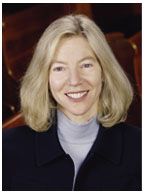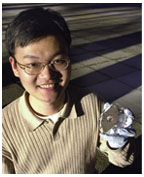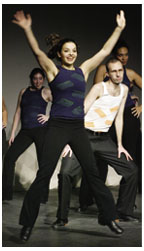February 11, 2004: Notebook
Team applies for patent for DNA prism
Mitchell and Sachs Scholars to study abroad
Half of the Class of 2008 admitted early

 |
Provost Amy Gutmann was nominated to be the next president of the University of Pennsylvania, likely closing a distinguished term as an administrator and longtime professor in the Department of Politics at Princeton. Penn’s Board of Trustees will vote on her appointment February 20.
Gutmann, who began her career at Princeton as an assistant professor in 1976, has drawn praise for her teaching, leadership, and research. She served as dean of the faculty from 1995 to 1997 and became provost in 2001.
At Penn, Gutmann succeeds Judith Rodin, the president for nearly 10 years. During Rodin’s term, annual fundraising and the university’s endowment tripled, and Penn climbed from 16th to 4th in the U.S. News & World Report rankings of top national research universities. Gutmann said Penn is “well positioned to face the opportunities and challenges that lie ahead.”
President Tilghman voiced support for her future Ivy presidential colleague. “For 28 years, Amy has been an exceptional teacher and scholar at Princeton,” she said, “and she has served with great distinction as dean of the faculty and, for the last two-and-a-half years, as provost.” Tilghman hopes to announce a successor early in the spring term.
Coverage of the search for Gutmann’s successor will be included
in a future edition of PAW. ![]()
By B.T.

A University task force studying campus health and well-being has identified numerous services that should be improved or expanded, including staffing and mental-health services at McCosh Health Center, child care for graduate students and staff, and health-education programs for all.
The 17-member task force, composed of faculty, students, and staff, was convened last fall to address three questions posed by President Tilghman: How should Princeton meet the needs of its students for medical and mental-health care, and to what extent should it also meet the health care needs of faculty and staff? What services should the University provide to promote the health and well-being of students, faculty, and staff, including preventive health programs, nutrition, recreation, and stress management? And how can the University improve the balance between family and work for members of the Princeton community?
The task force suggested increasing staffing at University Health Services, which saw usage increase 29 percent from 2000 to 2002, while staffing remained about the same. The report noted major increases in sexual-health visits (13 percent), psychiatric visits (25 percent), and inpatient stays for depression, anxiety, fatigue, and psychotic episodes (111 percent).
For undergraduates, the task force saw a need to meet a rising demand for mental-health services, especially services for depression, alcohol abuse, stress, and nutrition-related disorders.
Graduate students, the report found, would benefit from additional mental-health services, fitness programs, summer health coverage, and family-friendly policies. The report noted policies and practices that were initally designed to discourage graduate students with children from applying to Princeton, or discouraged graduate students at Princeton from having children: “While progress has been made in recent years, the task force believes that Princeton should become a friendlier place for graduate students with children.”
Identified faculty and staff issues revolve around work-life balance, child care, and health and wellness programs.
Vice President for Campus Life Janet Dickerson, cochair of the task force, says that in examining the programs and services offered, “We’ve discovered that we can learn, and benefit from, the experience, expertise, and ‘best practices’ of our peers. We are now gathering information from a variety of sources — through surveys and focus groups on campus; visits to other campuses; consultations with industry leaders — with the goal of making recommendations to enhance the health and well-being of our constituents.” A final report will be issued later this year.
The interim report can be found at www.princeton.edu/hwbtf/reports.shtml
and at www.princeton.edu/paw. ![]()
By L.O.

|
Lotien Richard Huang GS holds the device he designed to speed up the process of separating DNA. (Frank Wojchechowski) |
Team applies for patent for DNA prism
During a particularly dull moment at an international conference on electrical engineering in Washington, D.C., four years ago, Lotien Richard Huang GS began thinking about his research project, which involved separating recombinant DNA, a critical step in building gene libraries.
“All these weird ideas kept coming to me,” Huang recalled of the day. He wanted to speed up the time-consuming process of sorting stretches of genetic material, which is the only way to reveal the DNA sequence of a gene. Using standard methods, the process typically takes 10 hours or longer. Huang’s daydreaming paid off: He and his research colleagues, including professor of electrical engineering James Sturm ’79, professor of molecular biology Edward Cox, and physics professor Robert Austin, have applied for a patent for a device called a DNA prism, which has reduced the separation time dramatically: to about 15 seconds.
When Huang first shared his idea with colleagues, none immediately thought it would work. But they agreed to collaborate with him to find ways to apply electrical fields uniformly and how to load the DNA at a precise spot, no larger than 20 microns on a device as yet undesigned. At night, instead of sleeping, Huang spent hours drawing diagram after diagram to come up with a device that worked.
Sturm gives all credit to Huang, and explains that the new device is called a prism because the DNA that goes in gets separated according to molecular weight and goes out in different directions, as light does in a prism.
To build the minuscule prism, Huang transferred his designs from paper to computer and sent the files to a manufacturer, which created a mask to be used as a filter. Huang transferred the mask to a three-inch wide wafer, made up of fused silica. Using a process called reactive ion etching (R.I.E.) in a vacuum chamber, Huang created the prism, which has reduced separation time to seconds from hours, giving researchers a huge advance in building gene libraries.
Several hurdles remain to be overcome before the prism can be made available
commercially, including cost, reliability, and resolution. But Huang is
happy. “It feels good to invent something,” he says, “especially
when everybody else thought it wouldn’t work.” ![]()
By L.O.
|
Photo by Frank Wojciechowski |

Tappers (from left) Molly Spieczny ’04, Lisa Kemp ’06, Nadia Ben-Youssef
’06, Tudor Dimofte ’04, and Krystal Klingenberg ’06 perform
with a new student group, TapCats, in its inaugural performance, “Journey,”
last month. The group, organized by Dimofte and Charles Mugnolo ’05,
was joined for the performance by members of the Juggling Club and of
the High Steppers, a student rhythm group.
![]()
|
Mulcare
Romero
Vitale |

Two seniors majoring in the Woodrow Wilson School of Public and International Affairs have been awarded George J. Mitchell Scholarships for a year of postgraduate study at universities in Ireland and Northern Ireland.
Robert Mulcare, from Greenwich, Connecticut, will seek a master’s degree in economic policy evaluation at the National University of Ireland, Galway. Cynthia Romero, from North Brunswick, New Jersey, will pursue a master’s degree in comparative ethnic conflict at Queen’s University in Belfast.
The scholarships, inaugurated in 1998, recognize outstanding American students who exhibit the highest standards of academic excellence, leadership, and community service. Administered by the U.S.-Ireland Alliance, the scholarships are named in honor of the former U.S. senator and his role in the Northern Ireland peace process.
Vincent Vitale ’04 has received the Daniel Sachs Class of 1960
Graduating Scholarship, which will fund two years at Oxford University.
Vitale, from Point Pleasant Beach, New Jersey, will pursue a master’s
degree in philosophical theology. Classmates and friends established the
scholarship in memory of Daniel Sachs, who starred in football and lacrosse
at Princeton before attending Worcester College at Oxford University as
a Rhodes Scholar. He died of cancer at 28. The award is given to the senior
who best exemplifies Sachs’s character, intelligence, and commitment,
and whose scholarship is most likely to benefit the public. ![]()
Photographs: Denise Applewhite

In December, the University offered early admission to 581 students, a group that probably will comprise 49 percent of the Class of 2008, according to Dean of Admission Janet Rapelye. The number of early-decision candidates declined 25 percent from last year, but remained in line with the previous four years.
The binding early-decision program, adopted in 1995, is designed for students who have made Princeton their first choice. It requires students to apply by November 1 and agree not to apply to other colleges; those who are admitted must enroll. The early-action policies at Harvard, Yale, and Stanford, once binding, now require only that students not apply early to other schools, but allow them to apply to other institutions in the regular admission round.
Students admitted to Princeton early this year display impressive credentials,
with average S.A.T. I scores of 730 math and 730 verbal; 92 percent rank
in the top 10 percent of their high school classes. The number of engineering
students admitted early grew by 27 percent after declining for four years.
“They were a very strong group, and we wanted to show our commitment
to the engineering program,” says Rapelye.![]()
By B.T.

Dr. Sherwood Vine ’42 is soliciting submissions from the Princeton faculty for a collection of essays on their “basic living philosophies.” A first-time editor who has practiced medicine for more than 50 years, Vine came up with the idea while auditing courses at the University. He contacted 250 professors about the book, inspired by a similar collection entitled Living Philosophies, which includes essays from Albert Einstein, Jane Goodall, and Desmond Tutu. So far, 40 professors have sent favorable responses to Vine, who is in the process of securing a publisher.
The Board of Trustees approved seven new full professors. They are: Manjul Bhargava, professor of mathematics; Jan Gross, the Norman B. Tomlinson ’16 and ’48 Professor of War and Society; Thomas Palfrey III, professor of politics and economics; Brent Shaw, the Andrew Fleming West Professor in Classics; Michael Smith, professor of philosophy; Erik Sorensen, professor of chemistry and the Arthur Allan Patchett Professor in Organic Chemistry; and James Stone, professor of astrophysical sciences and applied and computational mathematics.
To commemorate its 55th reunion, the Class of 1947 began ’47 Lend-a-Hand,
a service project in which class members increased their volunteer hours.
The goal: 5,000 hours of service. As of last May, 163 participants had
volunteered 4,400 hours; the class hopes to achieve its goal this spring.
Class members tutor, work with the homeless and hungry, perform hospice
duties, and more. ![]()





